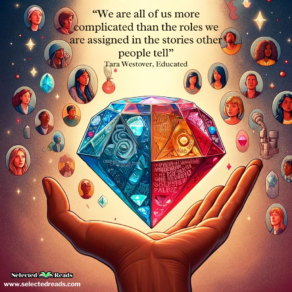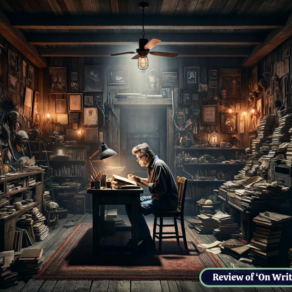Stephen King’s “On Writing: A Memoir of the Craft” stands as an exceptional guide from a master storyteller, offering invaluable insights into the art and discipline of writing. Having read it twice during my doctoral studies, I can attest to the depth of knowledge and inspiration it provides. King’s emphasis on the importance of reading as a cornerstone for any writer is particularly striking.
He shares, “I’m a slow reader, but I usually get through seventy or eighty books a year, most fiction. I don’t read in order to study the craft; I read because I like to read” (p. 145), underscoring that reading widely and frequently is fundamental to honing one’s craft. This post aims to share some of the most compelling quotes from the book, highlighting King’s wisdom on everything from the necessity of reading to the craft of writing itself.
Whether you’re a seasoned writer or just beginning to explore your narrative voice, King’s advice is a beacon, guiding us towards not just better writing, but a deeper, more meaningful engagement with the worlds we create.
Related: On Writing Stephen King Summary
Stephen King On Writing Quotes
The quotes provided here, complete with page numbers for reference, are drawn from the 2000 edition published by Scribner. Whether you’re navigating the initial stages of writing or looking to refine your skills further, King’s reflections offer a compass to guide your creative process, underscored by the belief that the essence of writing is found not only in the discipline it demands but also in the joy it sparks within both the writer and the reader.
1. “Books are a uniquely portable magic.” Stephen King, On Writing: A Memoir of the Craft, (p. 104)
2. “I believe the road to hell is paved with adverbs, and I will shout it from the rooftops. To put it another way, they’re like dandelions. If you have one on your lawn, it looks pretty and unique. If you fail to root it out, however, you find five the next day… fifty the day after that… and then, my brothers and sisters, your lawn is totally, completely, and profligately covered with dandelions. By then you see them for the weeds they really are, but by then it’s—GASP!!—too late.” Stephen King, On Writing: A Memoir of the Craft (p. 125)
“Description begins in the writer’s imagination, but should finish in the reader’s.”Stephen King, On Writing: A Memoir of the Craft (p. 174 )
“Writing is not life, but I think that sometimes it can be a way back to life.” Stephen King, On Writing: A Memoir of the Craft (p. 249 )
“Writing isn’t about making money, getting famous, getting dates, getting laid, or making friends. In the end, it’s about enriching the lives of those who will read your work, and enriching your own life, as well. It’s about getting up, getting well, and getting over. Getting happy, okay? Getting happy.” Stephen King, On Writing: A Memoir of the Craft (p. 269)
“Write with the door closed, rewrite with the door open.” Stephen King, On Writing: A Memoir of the Craft (p. 57)
“The scariest moment is always just before you start. After that, things can only get better.” Stephen King, On Writing: A Memoir of the Craft (p. 269)
“The more you read, the less apt you are to make a fool of yourself with your pen or word processor.” Stephen King, On Writing: A Memoir of the Craft (p. 150)
“Reading at meals is considered rude in polite society, but if you expect to succeed as a writer, rudeness should be the second-to-least of your concerns. The least of all should be polite society and what it expects.” Stephen King, On Writing: A Memoir of the Craft (p. 148)
“All I ask is that you do as well as you can, and remember that, while to write adverbs is human, to write he said or she said is divine.” Stephen King, On Writing: A Memoir of the Craft (p. 128)
“To write is human, to edit is divine.” Stephen King, On Writing: A Memoir of the Craft (p. 13)
“Put your vocabulary on the top shelf of your toolbox, and don’t make any conscious effort to improve it ( you will be doing that as you read). One of the really bad things you can do to your writing is to dress up your vocabulary looking for long words because you are may be a little bit ashamed of your short ones… Remember that the basic rule of vocabulary is use the first word that comes to your mind. If you hesitate and cogitated, you will come up with anther word but it probably wont be as good as your first one, or as close to what you really mean….Why in God’s name would you want to make things worse by choosing a word which is only cousin to the one you really wanted to use ?” Stephen King, On Writing: A Memoir of the Craft (p. 117)
“Let me say it again: You must not come lightly to the blank page.”Stephen King, On Writing: A Memoir of the Craft (p. 106)
“I have spent a good many years since―too many, I think―being ashamed about what I write. I think I was forty before I realized that almost every writer of fiction or poetry who has ever published a line has been accused by someone of wasting his or her God-given talent. If you write (or paint or dance or sculpt or sing, I suppose), someone will try to make you feel lousy about it, that’s all.” Stephen King, On Writing: A Memoir of the Craft (p. 50)
“Writing is seduction. Good talk is part of seduction. If not so, why do so many couples who start the evening at dinner wind up in bed?” Stephen King, On Writing: A Memoir of the Craft (p. 134)
“It’s hard for me to believe that people who read very little (or not at all in some cases) should presume to write and expect people to like what they have written.” Stephen King, On Writing: A Memoir of the Craft (p. 147)
“Many writers are attracted to passive verbs; but I am willing to. I think timid writers like them for the same reason timid lovers like passive partners. The passive voice is safe. There is no troublesome action to contend with; the subject just has to close its eyes and think of England, to paraphrase Queen Victoria. I think unsure writers also feel the passive voice somehow lends their work authority, perhaps even a quality of majesty”. Stephen King, On Writing: A Memoir of the Craft (p. 123)
“Words create sentences; sentences create paragraphs; sometimes paragraphs quicken and begin to breathe.” Stephen King, On Writing: A Memoir of the Craft (p. 135)
“Can I be blunt on this subject? If you don’t have time to read, you don’t have the time (or the tools) to write. Simple as that.” Stephen King, On Writing: A Memoir of the Craft (p. 147)
“If you want to be a writer, you must do two things above all others: read a lot and write a lot. There’s no way around these two things that I’m aware of, no shortcut.” Stephen King, On Writing: A Memoir of the Craft (p. 145)
“It starts with this: put your desk in the corner, and every time you sit down there to write, remind yourself why it isn’t in the middle of the room. Life isn’t a support system for art. It’s the other way around.” Stephen King, On Writing: A Memoir of the Craft (p. 101)
“Optimism is a perfectly legitimate response to failure.” Stephen King, On Writing: A Memoir of the Craft (p. 40)
“Good story ideas seem to come quite literally from nowhere, sailing at you right out of the empty sky: two previously unrelated ideas come together and make something new under the sun. Your job isn’t to find these ideas but to recognize them when they show up.” Stephen King, On Writing: A Memoir of the Craft (p. 37)
“I’m a slow reader, but I usually get through seventy or eighty books a year, most fiction. I don’t read in order to study the craft; I read because I like to read.” Stephen King, On Writing: A Memoir of the Craft (p. 145)
“Fool me once, shame on you. Fool me twice, shame on me. Fool me three times, shame on both of us.” Stephen King, On Writing: A Memoir of the Craft (p. 25)
“Reading is the creative centre of a writer’s life. I take a book with me everywhere I go, and find there are all sorts of opportunities to dip in. The trick is to teach yourself to read in small sips as well as in long swallows. Waiting rooms were made for books of course! but so are theater lobbies before the show, long and boring checkout lines.” Stephen King, On Writing: A Memoir of the Craft (p. 147)
“You can approach the act of writing with nervousness, excitement, hopefulness, or despair … Come to it any way but lightly.” Stephen King, On Writing: A Memoir of the Craft (p. 106)
“When you write a book, you spend day after day scanning and identifying the trees. When you’re done, you have to step back and look at the forest.” Stephen King, On Writing: A Memoir of the Craft (p. 201)
“If possible, there should be no telephone in your writing room, certainly no TV or video games for you to fool around with. If there is a window, draw the curtains or pull down the shades unless it looks out at a wall. For any writer, but for the beginning writer in particular, it is wise to eliminate every possible distraction. If you continue to write , you will begin to filter out these distractions naturally, but at the start, it’s best to try and take care of them before you write.” Stephen King, On Writing: A Memoir of the Craft (p. 156)
“I think the best stories always end up being about the people rather than the event, which is to say character-driven.” Stephen King, On Writing: A Memoir of the Craft (p. 190)
Final thoughts
By sharing his personal journey and the lessons learned along the way, King offers both encouragement and practical advice to writers at all levels. The quotes selected here from On Writing: A Memoir of The Craft, serve as a glimpse into the wealth of knowledge contained within its pages. Whether you’re seeking inspiration, guidance on the technical aspects of writing, or insights into the lifestyle and habits that support a writing career, King’s memoir is an indispensable resource.


























